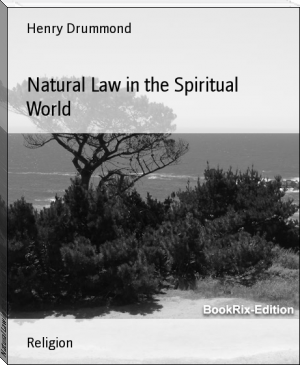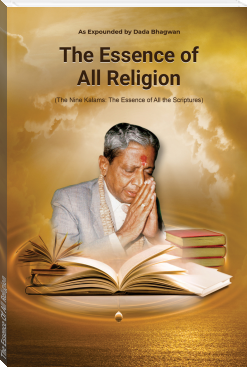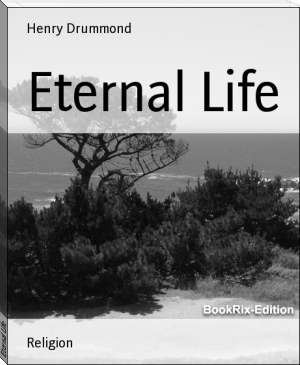Natural Law in the Spiritual World - Henry Drummond (feel good novels txt) 📗

- Author: Henry Drummond
Book online «Natural Law in the Spiritual World - Henry Drummond (feel good novels txt) 📗». Author Henry Drummond
de-humanized men who are discovered sometimes upon desert islands. If it is his mind, it will degenerate into imbecility and madness--solitary confinement has the power to unmake men's minds and leave them idiots. If he neglect his conscience, it will run off into lawlessness and vice. Or, lastly, if it is his soul, it must inevitably atrophy, drop off in ruin and decay.
We have here, then, a thoroughly natural basis for the question before us. If we neglect, with this universal principle staring us in the face, how shall we escape? If we neglect the ordinary means of keeping a garden in order, how shall it escape running to weeds and waste? Or, if we neglect the opportunities for cultivating the mind, how shall it escape ignorance and feebleness? So, if we neglect the soul, how shall it escape the natural retrograde movement, the inevitable relapse into barrenness and death?
It is not necessary, surely, to pause for proof that there is such a retrograde principle in the being of every man. It is demonstrated by facts, and by the analogy of all Nature. Three possibilities of life, according to Science, are open to all living organisms--Balance, Evolution, and Degeneration. The first denotes the precarious persistence of a life along what looks like a level path, a character which seems to hold its own alike against the attacks of evil and the appeals of good. It implies a set of circumstances so balanced by choice or fortune that they neither influence for better nor for worse. But except in theory this state of equilibrium, normal in the inorganic kingdom, is really foreign to the world of life; and what seems inertia may be a true Evolution unnoticed from its slowness, or likelier still a movement of Degeneration subtly obliterating as it falls the very traces of its former height. From this state of apparent Balance, Evolution is the escape in the upward direction, Degeneration in the lower. But Degeneration, rather than Balance or Elaboration, is the possibility of life embraced by the majority of mankind. And the choice is determined by man's own nature. The life of Balance is difficult. It lies on the verge of continual temptation, its perpetual adjustments become fatiguing, its measured virtue is monotonous and uninspiring. More difficult still, apparently, is the life of ever upward growth. Most men attempt it for a time, but growth is slow; and despair overtakes them while the goal is far away. Yet none of these reasons fully explains the fact that the alternative which remains is adopted by the majority of men. That Degeneration is easy only half accounts for it. Why is it easy? Why but that already in each man's very nature this principle is supreme? He feels within his soul a silent drifting motion impelling him downward with irresistible force. Instead of aspiring to Conversion to a higher Type he submits by a law of his nature to Reversion to a lower. This is Degeneration--that principle by which the organism, failing to develop itself, failing even to keep what it has got, deteriorates, and becomes more and more adapted to a degraded form of life.
All men who know themselves are conscious that this tendency, deep-rooted and active, exists within their nature. Theologically it is described as a gravitation, a bias toward evil. The Bible view is that man is conceived in sin and shapen in iniquity. And experience tells him that he will shape himself into further sin and ever deepening iniquity without the smallest effort, without in the least intending it, and in the most natural way in the world if he simply let his life run. It is on this principle that, completing the conception, the wicked are said further in the Bible to be lost. They are not really lost as yet, but they are on the sure way to it. The bias of their lives is in full action. There is no drag on anywhere. The natural tendencies are having it all their own way; and although the victims may be quite unconscious that all this is going on, it is patent to every one who considers even the natural bearings of the case that "the end of these things is Death." When we see a man fall from the top of a five-story house, we say the man is lost. We say that before he has fallen a foot; for the same principle that made him fall the one foot will undoubtedly make him complete the descent by falling another eighty or ninety feet. So that he is a dead man, or a lost man from the very first. The gravitation of sin in a human soul acts precisely in the same way. Gradually, with gathering momentum it sinks a man further and further from God and righteousness, and lands him, by the sheer action of a natural law, in the hell of a neglected life.
But the lesson is not less clear from analogy. Apart even from the law of Degeneration, apart from Reversion to Type, there is in every living organism a law of Death. We are wont to imagine that Nature is full of Life. In reality it is full of Death. One cannot say it is natural for a plant to live. Examine its nature fully, and you have to admit that its natural tendency is to die. It is kept from dying by a mere temporary endowment which gives it an ephemeral dominion over the elements--gives it power to utilize for a brief span the rain, the sunshine, and the air. Withdraw this temporary endowment for a moment and its true nature is revealed. Instead of overcoming Nature it is overcome. The very things which appeared to minister to its growth and beauty now turn against it and make it decay and die. The sun which warmed it, withers it; the air and rain which nourished it, rot it. It is the very forces which we associate with life which, when their true nature appears, are discovered to be really the ministers of death.
This law, which is true for the whole plant-world, is also valid for the animal and for man. Air is not life, but corruption--so literally corruption that the only way to keep out corruption, when life has ebbed, is to keep out air. Life is merely a temporary suspension of these destructive powers; and this is truly one of the most accurate definitions of life we have yet received--"the sum total of the functions which resist death."
Spiritual life, in like manner, is the sum total of the functions which resist sin. The soul's atmosphere is the daily trial, circumstance, and temptation of the world. And as it is life alone which gives the plant power to utilize the elements, and as, without it, they utilize it, so it is the spiritual life alone which gives the soul power to utilize temptation and trial; and without it they destroy the soul. How shall we escape if we refuse to exercise these functions--in other words, if we neglect?
This destroying process, observe, goes on quite independently of God's judgment on sin. God's judgment on sin is another and a more awful fact of which this may be a part. But it is a distinct fact by itself, which we can hold and examine separately, that on purely natural principles the soul that is left to itself unwatched, uncultivated, unredeemed, must fall away into death by its own nature. The soul that sinneth "it shall die." It shall die, not necessarily because God passes sentence of death upon it, but because it cannot help dying. It has neglected "the functions which resist death" and has always been dying. The punishment is in its very nature, and the sentence is being gradually carried out all along the path of life by ordinary processes which enforce the verdict with the appalling faithfulness of law.
There is an affectation that religious truths lie beyond the sphere of the comprehension which serves men in ordinary things. This question at least must be an exception. It lies as near the natural as the spiritual. If it makes no impression on a man to know that God will visit his iniquities upon him, he cannot blind himself to the fact that Nature will. Do we not all know what it is to be punished by Nature for disobeying her? We have looked round the wards of a hospital, a prison, or a madhouse, and seen there Nature at work squaring her accounts with sin. And we knew as we looked that if no Judge sat on the throne of heaven at all there was a Judgment there, where an inexorable Nature was crying aloud for justice, and carrying out her heavy sentences for violated laws.
When God gave Nature the law into her own hands in this way, He seems to have given her two rules upon which her sentences were to be based. The one is formally enunciated in this sentence, "WHATSOEVER A MAN SOWETH THAT SHALL HE ALSO REAP." The other is informally expressed in this, "IF WE NEGLECT HOW SHALL WE ESCAPE?"
The first is the positive law, and deals with sins of commission. The other, which we are now discussing, is the negative, and deals with sins of omission. It does not say anything about sowing but about not sowing. It takes up the case of souls which are lying fallow. It does not say, if we sow corruption we shall reap corruption. Perhaps we would not be so unwise, so regardless of ourselves, of public opinion, as to sow corruption. It does not say, if we sow tares we shall reap tares. We might never do anything so foolish as sow tares. But if we sow nothing, it says, we shall reap nothing. If we put nothing into the field, we shall take nothing out. If we neglect to cultivate in summer, how shall we escape starving in winter?
Now the Bible raises this question, but does not answer it--because it is too obvious to need answering. How shall we escape if we neglect? The answer is, we cannot. In the nature of things we cannot. We cannot escape any more than a man can escape drowning who falls into the sea and has neglected to learn to swim. In the nature of things he cannot escape--nor can he escape who has neglected the great salvation.
Now why should such fatal consequences follow a simple process like neglect? The popular impression is that a man, to be what is called lost, must be an open and notorious sinner. He must be one who has abandoned all that is good and pure in life, and sown to the flesh with all his might and main. But this principle goes further. It says simply, "If we neglect." Any one may see the reason why a notoriously wicked person should not escape; but why should not all the rest of us escape? What is to hinder people who are not notoriously wicked escaping--people who never sowed anything in particular? Why is it such a sin to sow nothing in particular?
There must be some hidden and vital relation between these three words, Salvation, Neglect, and Escape--some reasonable, essential, and indissoluble connection. Why are these words so linked together as to weight this clause with all the authority and solemnity of a sentence of death?
The explanation has partly been given already. It lies still further, however, in the meaning of the word Salvation. And this, of course, is not at all Salvation in the ordinary sense of forgiveness of sin. This is one great meaning of Salvation, the first and the greatest. But this is spoken to people who are supposed to have had this. It is the broader word, therefore, and
We have here, then, a thoroughly natural basis for the question before us. If we neglect, with this universal principle staring us in the face, how shall we escape? If we neglect the ordinary means of keeping a garden in order, how shall it escape running to weeds and waste? Or, if we neglect the opportunities for cultivating the mind, how shall it escape ignorance and feebleness? So, if we neglect the soul, how shall it escape the natural retrograde movement, the inevitable relapse into barrenness and death?
It is not necessary, surely, to pause for proof that there is such a retrograde principle in the being of every man. It is demonstrated by facts, and by the analogy of all Nature. Three possibilities of life, according to Science, are open to all living organisms--Balance, Evolution, and Degeneration. The first denotes the precarious persistence of a life along what looks like a level path, a character which seems to hold its own alike against the attacks of evil and the appeals of good. It implies a set of circumstances so balanced by choice or fortune that they neither influence for better nor for worse. But except in theory this state of equilibrium, normal in the inorganic kingdom, is really foreign to the world of life; and what seems inertia may be a true Evolution unnoticed from its slowness, or likelier still a movement of Degeneration subtly obliterating as it falls the very traces of its former height. From this state of apparent Balance, Evolution is the escape in the upward direction, Degeneration in the lower. But Degeneration, rather than Balance or Elaboration, is the possibility of life embraced by the majority of mankind. And the choice is determined by man's own nature. The life of Balance is difficult. It lies on the verge of continual temptation, its perpetual adjustments become fatiguing, its measured virtue is monotonous and uninspiring. More difficult still, apparently, is the life of ever upward growth. Most men attempt it for a time, but growth is slow; and despair overtakes them while the goal is far away. Yet none of these reasons fully explains the fact that the alternative which remains is adopted by the majority of men. That Degeneration is easy only half accounts for it. Why is it easy? Why but that already in each man's very nature this principle is supreme? He feels within his soul a silent drifting motion impelling him downward with irresistible force. Instead of aspiring to Conversion to a higher Type he submits by a law of his nature to Reversion to a lower. This is Degeneration--that principle by which the organism, failing to develop itself, failing even to keep what it has got, deteriorates, and becomes more and more adapted to a degraded form of life.
All men who know themselves are conscious that this tendency, deep-rooted and active, exists within their nature. Theologically it is described as a gravitation, a bias toward evil. The Bible view is that man is conceived in sin and shapen in iniquity. And experience tells him that he will shape himself into further sin and ever deepening iniquity without the smallest effort, without in the least intending it, and in the most natural way in the world if he simply let his life run. It is on this principle that, completing the conception, the wicked are said further in the Bible to be lost. They are not really lost as yet, but they are on the sure way to it. The bias of their lives is in full action. There is no drag on anywhere. The natural tendencies are having it all their own way; and although the victims may be quite unconscious that all this is going on, it is patent to every one who considers even the natural bearings of the case that "the end of these things is Death." When we see a man fall from the top of a five-story house, we say the man is lost. We say that before he has fallen a foot; for the same principle that made him fall the one foot will undoubtedly make him complete the descent by falling another eighty or ninety feet. So that he is a dead man, or a lost man from the very first. The gravitation of sin in a human soul acts precisely in the same way. Gradually, with gathering momentum it sinks a man further and further from God and righteousness, and lands him, by the sheer action of a natural law, in the hell of a neglected life.
But the lesson is not less clear from analogy. Apart even from the law of Degeneration, apart from Reversion to Type, there is in every living organism a law of Death. We are wont to imagine that Nature is full of Life. In reality it is full of Death. One cannot say it is natural for a plant to live. Examine its nature fully, and you have to admit that its natural tendency is to die. It is kept from dying by a mere temporary endowment which gives it an ephemeral dominion over the elements--gives it power to utilize for a brief span the rain, the sunshine, and the air. Withdraw this temporary endowment for a moment and its true nature is revealed. Instead of overcoming Nature it is overcome. The very things which appeared to minister to its growth and beauty now turn against it and make it decay and die. The sun which warmed it, withers it; the air and rain which nourished it, rot it. It is the very forces which we associate with life which, when their true nature appears, are discovered to be really the ministers of death.
This law, which is true for the whole plant-world, is also valid for the animal and for man. Air is not life, but corruption--so literally corruption that the only way to keep out corruption, when life has ebbed, is to keep out air. Life is merely a temporary suspension of these destructive powers; and this is truly one of the most accurate definitions of life we have yet received--"the sum total of the functions which resist death."
Spiritual life, in like manner, is the sum total of the functions which resist sin. The soul's atmosphere is the daily trial, circumstance, and temptation of the world. And as it is life alone which gives the plant power to utilize the elements, and as, without it, they utilize it, so it is the spiritual life alone which gives the soul power to utilize temptation and trial; and without it they destroy the soul. How shall we escape if we refuse to exercise these functions--in other words, if we neglect?
This destroying process, observe, goes on quite independently of God's judgment on sin. God's judgment on sin is another and a more awful fact of which this may be a part. But it is a distinct fact by itself, which we can hold and examine separately, that on purely natural principles the soul that is left to itself unwatched, uncultivated, unredeemed, must fall away into death by its own nature. The soul that sinneth "it shall die." It shall die, not necessarily because God passes sentence of death upon it, but because it cannot help dying. It has neglected "the functions which resist death" and has always been dying. The punishment is in its very nature, and the sentence is being gradually carried out all along the path of life by ordinary processes which enforce the verdict with the appalling faithfulness of law.
There is an affectation that religious truths lie beyond the sphere of the comprehension which serves men in ordinary things. This question at least must be an exception. It lies as near the natural as the spiritual. If it makes no impression on a man to know that God will visit his iniquities upon him, he cannot blind himself to the fact that Nature will. Do we not all know what it is to be punished by Nature for disobeying her? We have looked round the wards of a hospital, a prison, or a madhouse, and seen there Nature at work squaring her accounts with sin. And we knew as we looked that if no Judge sat on the throne of heaven at all there was a Judgment there, where an inexorable Nature was crying aloud for justice, and carrying out her heavy sentences for violated laws.
When God gave Nature the law into her own hands in this way, He seems to have given her two rules upon which her sentences were to be based. The one is formally enunciated in this sentence, "WHATSOEVER A MAN SOWETH THAT SHALL HE ALSO REAP." The other is informally expressed in this, "IF WE NEGLECT HOW SHALL WE ESCAPE?"
The first is the positive law, and deals with sins of commission. The other, which we are now discussing, is the negative, and deals with sins of omission. It does not say anything about sowing but about not sowing. It takes up the case of souls which are lying fallow. It does not say, if we sow corruption we shall reap corruption. Perhaps we would not be so unwise, so regardless of ourselves, of public opinion, as to sow corruption. It does not say, if we sow tares we shall reap tares. We might never do anything so foolish as sow tares. But if we sow nothing, it says, we shall reap nothing. If we put nothing into the field, we shall take nothing out. If we neglect to cultivate in summer, how shall we escape starving in winter?
Now the Bible raises this question, but does not answer it--because it is too obvious to need answering. How shall we escape if we neglect? The answer is, we cannot. In the nature of things we cannot. We cannot escape any more than a man can escape drowning who falls into the sea and has neglected to learn to swim. In the nature of things he cannot escape--nor can he escape who has neglected the great salvation.
Now why should such fatal consequences follow a simple process like neglect? The popular impression is that a man, to be what is called lost, must be an open and notorious sinner. He must be one who has abandoned all that is good and pure in life, and sown to the flesh with all his might and main. But this principle goes further. It says simply, "If we neglect." Any one may see the reason why a notoriously wicked person should not escape; but why should not all the rest of us escape? What is to hinder people who are not notoriously wicked escaping--people who never sowed anything in particular? Why is it such a sin to sow nothing in particular?
There must be some hidden and vital relation between these three words, Salvation, Neglect, and Escape--some reasonable, essential, and indissoluble connection. Why are these words so linked together as to weight this clause with all the authority and solemnity of a sentence of death?
The explanation has partly been given already. It lies still further, however, in the meaning of the word Salvation. And this, of course, is not at all Salvation in the ordinary sense of forgiveness of sin. This is one great meaning of Salvation, the first and the greatest. But this is spoken to people who are supposed to have had this. It is the broader word, therefore, and
Free e-book «Natural Law in the Spiritual World - Henry Drummond (feel good novels txt) 📗» - read online now
Similar e-books:





Comments (0)